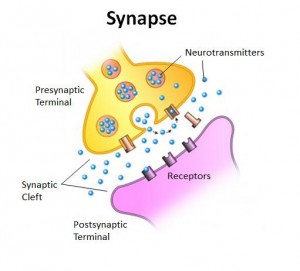How are Brain Chemicals Affected by ASD?
 Changes are observed in the neurochemicals in the brain as well—both hormones and neurotransmitters.
Changes are observed in the neurochemicals in the brain as well—both hormones and neurotransmitters.
Hormones, including neuropeptides, can modulate or change the level of activity of a neuron as well as affect neuronal pathways. Some forms of Autism Spectrum Disorder (ASD) are correlated with low levels of the neuropeptide oxytocin in the blood.1 Others have been shown to have problems with a key receptor for vasopressin. Both hormones play an important role in social recognition, social contact, and social bonding in humans and other mammals.
Neurotransmitters are the chemical signals by which neurons communicate with each other. Changes in levels of the neurotransmitter serotonin are found in people with ASD.2 Serotonin regulates the neuropeptides oxytocin and vasopressin, described above. But serotonin does much more than that. It also plays roles in the growth and differentiation (or specialization) of neurons; the myelination of a neuron’s axons, or outputs (which increases the speed of a neuron’s signal); and, the formation of synapses. If a person has less serotonin, that could affect all of these processes.
| References: |
|

